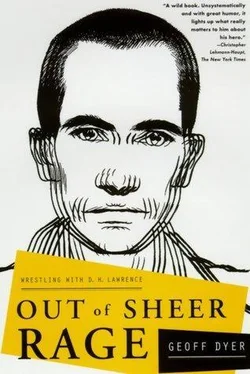In Oaxaca, I thought to myself in Rome, I did not accomplish what I set out to accomplish. Fine, fine. Except I could not accept that, could not abide by the consequences of that failure. The only way I could rectify things, it seemed, was to leave Rome immediately, to set out for Oaxaca on the first available plane. That was the only possible course of action. That is what I will do, I said to myself. I will go to Oaxaca. Immediately. But, equally, even as I was filled with the power of this implacable resolution to make good my previous mistake, I knew that I would not go to Oaxaca again, that I had no intention of going to Oaxaca, that of all the places on earth I might return to, Oaxaca was not one of them, that this determination to go back to Oaxaca was actually a way of coming to terms with not going to Oaxaca, was a way of atoning for my earlier failure by compounding it.
And out of this, it seems to me now, out of compound failures like these, comes a kind of contentment. I cannot accept myself as I am but, ultimately, I am resigned to accepting this inability to accept myself as I am. Anything, anything — as long as it doesn’t involve the slightest effort or inconvenience. ‘Let a man go to the bottom of what he is, ’ wrote Lawrence, ‘and believe in that.’
Still, however bad I felt after Oaxaca and however ill Laura had been, it was nothing compared with the state Lawrence got himself into. He left Oaxaca ‘a mere wreck’. By then, though, he must have been used to feeling like this, to feeling ‘seedy’ the whole time, to being laid up in bed and plagued, even in interludes of relatively good health, by colds and coughs.
Imagine being Lawrence, imagine being ill like that. I can’t imagine anything worse. I dread being ill. I live in terror of it. One of the symptoms, in fact, of this symptomless illness I have decided I am suffering from is a pathological dread of getting ill, a phantom hypochondria: I haven’t had a cold for over a year now and the longer I go without getting one the more dreadful the prospect becomes. But how can you avoid getting a cold, I often find myself thinking, when everyone else has one? Talk about sick office, or sick building syndrome: most cities suffer from sick city syndrome. London is the worst. Lawrence realised this in 1916: London was ‘so foul’, he reckoned, that ‘one would die in it in a fortnight’. Since then it’s got even worse. Now it’s the world capital of flu. The sky in London drizzles flu, it rains flu. People from all over the world go there and get flu. Whether they come to see the changing of the guard, or to take ecstasy at raves, they all end up getting flu. Those who work in London are all either going down with flu, recovering from flu, or in the grip of flu — even though most of the people going down with flu, recovering from flu or in the grip of flu don’t have flu at all. What they’re actually suffering from is verbal inflation because no one says they have a cold any more, it’s always flu. If people have a cold they say they have flu; if they say they have a cold it means there’s nothing wrong with them. Flu and cold are becoming interchangeable. We say flu when we mean cold but we say flu when we mean flu because no one wants to say they have pneumonia when all they’ve got is flu because if you say you have pneumonia people might think you have AIDS. It’s even possible that people who do have pneumonia call it flu so that flu now runs the whole gamut of illness from the common cold upwards. To say we have flu is merely to express the common condition of urban life at the tail-end of the twentieth century. One way or another we all have flu all the time, even during those periods when we are, to all intents and purposes, in perfect health. Seen in a certain light there’s barely a moment in the year when we don’t have flu.
Having said that, I haven’t had a cold or flu for over a year. Not a sniffle. Why? Because I don’t have a job or children. If I had followed through with my intention of getting a job in Dullford I would have had at least four colds in the last year and if I had children it could easily have been double that number. Offices are places of contagion and so are schools. People in offices and parents with children catch colds all the time. These are facts. There is a whole array of new viruses going around the playgrounds now, different ones to the ones that were going round when we were at school and to which, over the years, we have developed immunity. Children bring these new viruses home from school and adults have no immunity against them. Stay away from children and stay away from parents who become infected by their children’s germs. Take evasive action. Stay away from everyone if necessary. Even talking on the phone is risky. There are cases of people catching virulent strains of flu over the telephone. Still, better to get flu than become a germ paranoiac, a germ recluse. Only by going out into the world can you build up resistance to it. By staying in, by keeping away from schools and offices, you actually become more prone to infection, more likely to go down with flu. Better to get out in the world, better to board a train full of sniffers, sneezers and coughers, even if it entails a young woman sitting diagonally opposite you, full up with a cold: sniffling, her eyes all glazed and watery, feeling terrible, blowing her nose in used tissues. My first impulse was to change seats but I thought this might be rude, and because I was worried about appearing rude I became angry that this woman had put me in the awkward position whereby I had either to behave rudely or risk infection. Besides, I thought, I was here before her, I posed no risk to my fellow-passengers’ health, why should I move? If anyone was going to move it would be her, not me. I was going to sit here no matter what. The more I thought about it the more it seemed not simply an act of gross selfishness that she had chosen to sit where she had, but actually an outrage that British Rail had permitted her to travel and risk infecting other paying customers with what was clearly a virulent strain of flu. I thought these thoughts in a semi-formalised way, almost as if composing a draft letter of complaint to the customer services manager. Even as I resolved to stay put I decided to move to a different seat but as soon as I made up my mind to move I saw there were no empty seats so that I was now faced with an even starker choice: either I could stay where I was and catch a virulent strain of flu or I could stand. I had no intention of standing, obviously, so I forced myself deep into my seat and read the paper (full, incidentally, of graphic expressionist advertisements for cold and flu cures), using it as a shield and consoling myself with the thought that actually this was quite a good seat because I was facing backwards, was ahead of the woman opposite me, so that, as she exhaled, her germs were taken back down the train. The more I dwelt on this the more I seemed to be in a good position because the person most at risk from her germs was probably the person sitting down-wind, down-train, from her, oblivious to the contagion that lurked nearby, whereas I was relatively safe and could, metaphorically speaking, keep an eye on her from behind my paper while preparing my defences, steeling my immune system against possible assault. No sooner had I thought this than I realised that for all I knew there was someone up-train from me, suffering from an even more virulent strain of flu, blowing his or her germs back towards me. In fact this seemed not just probable but highly likely since the train was full of the sound of sneezing, coughing, nose blowing and sniffling. The clack of the wheels was all but lost beneath the sound of sniffling, sneezing, coughing and nose blowing. As far as I could make out I was actually the only person on the train who was not sneezing, sniffling, nose blowing or coughing. Everyone else was practically dying of flu, the air was full of bits of mucus-soaked Kleenex that had floated off from over-used packs of tissue. It was like being on a hospital train during the great flu epidemic of 1919. . My own breathing was becoming laboured, stuffy — I woke up with a jolt, the Guardian shrouding my face, semi-suffocated by newsprint. The woman opposite me was still there, pestilential, sniffling. The train had stopped suddenly in the middle of the dark countryside. There was a house with lights on, surrounded by endemic darkness.
Читать дальше












